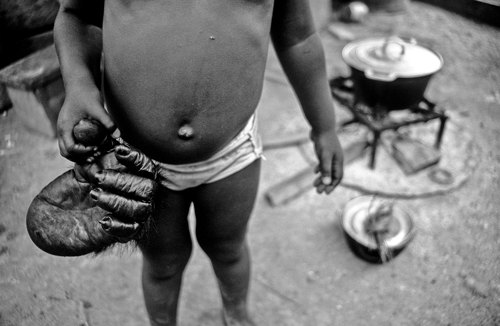Jean-Eric FABRE
This post is also available in:
 Anglais
Anglais
The term "bush meat" refers to all types of game, protected species or not. Men hunt wildlife in the rainforests from 100 000 years. For years, the impact of the hunt was reduced and the vastness of the forests and the difficult access to wetlands in the Congo basin has limited the level of predation on wildlife. Hunting remained a source of livelihood for populations of hunter – gatherers. The opening track to the heart of the forest for logging – even if it is not directly responsible; allows hunters to access areas increasingly remote access to which is rarely checked. Lack of resources and facing a social phenomenon, the authorities are rarely present and bushmeat has become a lucrative business. Successive civil wars have deployed to combat zones, quotas also feeding at the expense of wildlife. The impact of trade of bushmeat on African wildlife is difficult to assess because of the huge area involved and the limited knowledge we have on staffing levels and turnover rates of populations. In general, species that suffer most are the large species with slow reproductive cycle. This applies, for example, elephants, and especially the great apes, including gorillas and chimpanzees who pay a heavy price for this trade. If this practice contributes to the very short term, development of local economies and allows the poorest rural populations to support their food needs on a daily basis – for how long? it seriously undermines the future of the entire ecosystem.
NEWSLETTER
Pour recevoir nos informations, inscrivez votre adresse email.EN SAVOIR PLUS

Pour Que l’Esprit Vive,
Association loi 1901 reconnue d’utilité publique
Siège social
20 rue Lalande,
75014 Paris – France


